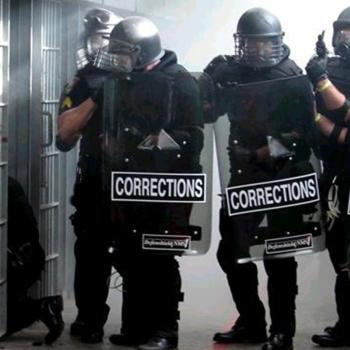“Ya Know, Everyone’s Replaceable…”
Many years ago, I worked in childcare at the local YMCA. I was going to school to get my teaching degree, and I thought it would be great to work with the kids I’d be teaching someday. As the Summer Camp Director and then as the School Year Childcare Director, it was my job to open the building at 5:30 a.m., Monday through Friday, go to school for my own course work, then return at 4:00 p.m. and lock up after the last child had been picked up. It was a great job. I’d plan field trips each week of the summer based on the week’s theme. We’d have Pirate Week, where we’d watch a pirate movie, eat pirate food, and go to a local amusement park dressed as pirates. Or we’d have French Week, where we eat baguette and cheese for lunch, drink grape juice instead of wine, and go to a bakery for a tour (and samples) of French pastries.

I had a great time getting to know the kids and their parents. One day, one of the grandfathers of one of the boys came in looking a bit off. I asked, “Charlie, what’s up? Why so down? He looked straight ahead at his grandson and said quietly, “Ya know, everyone’s replaceable… right?” I could see something was weighing on him, but I didn’t want to push it. I offered some water or tea that we had in the back. He accepted, and I brought out a bottle of tea. We sat beside each other, and he finally said, “I was let go today.” I was stunned. Charlie was one of the best car mechanics I’d ever known. He looked over at me and said, “Yup. The owner came in and told me they were ‘downsizing’ and that, on paper, I was costing them too much money since I’d been there 28 years. So, I had to go.” He took a deep drink of the tea and said, “Ya know, everyone’s replaceable. Those were the words the owner said as I was walking out the door with my tool bag.” Charlie didn’t know how to pay for his grandson to come to the daycare anymore, and I assured him it was no problem. We had scholarships available for just this sort of thing.

Just five minutes after Charlie and his grandson left, Billy came to pick up his daughter. Billy was a younger version of Charlie. He was very pleasant, affable, and usually quick with a joke. Today, he was exuberant. “I got a job today!” He had been out of work for about six months. “I start working tomorrow at…” He named the dealership Charlie had just been let go from. Billy was Charlie’s replacement.
Fast Forward
The following summer, I was doing my thing with the kids at summer camp. We were going on field trips, we were creating sea battles on dry land, we were fighting dragons in the creek. I got a call from one of my younger female counselors that she really needed me to come out to a local park where she had her group of kids. She sounded distraught and out of sorts, so I took my car and went out to see what was wrong. When I got to the park, the kids were having a great time on the gym equipment and playing kickball. My counselor was sitting by herself on a park bench close to the action—knees drawn up with her arms wrapped tightly around them. Her face was buried between. It was apparent she’d been crying.
“What’s up?” I asked, trying not to show that I’d seen her distress.
“Just found out. I have cervical cancer.”
The world stopped for a second. Here is a young, athletic, very sweet, early twenties young woman who is amazing with kids, and she has news dropped on her like this. I sat next to her, and we chatted for quite a while about the next steps and what she needed to do. Her mind naturally started racing to all the “what ifs” one goes through when hearing a diagnosis like that. In our discussion, we’d lost track of time until I got a call from the YMCA assistant director, who was wondering where we were. I apologized and told him I’d be back with the kids ASAP. I thought it best to drive the van with the kids, so I gave my car keys to the other counselor and told her to drive my car.
When we returned to the YMCA, I was immediately called into the assistant director’s office. Without a pause, he said, “You’re fired! You left the premises without permission and didn’t return the children at the scheduled time. I’m firing you for job abandonment!”

I was stunned. Instead of pleading my case and telling him what was going on, I turned to leave the room, regroup, and come back to explain in a few moments. That’s when he said it. “Ya know, everyone’s replaceable… right?” Thoughts of Charlie and Billy flooded my mind. I was confused, hurt, angry, but mostly done. Instead of telling him what happened, I packed up my office and left the front door keys in the middle of the desk.
What Are You Worth?
The truth is, in business, the phrase “everyone’s replaceable” is accurate. A company is an animal that is set up to be fed. It devours time, sweat, tears, money, and lives. But it has no heart. It has no soul. Companies are not communities of give and take—of care and concern. No. Of course, companies are run—and peopled—by humans, but companies in themselves have no sense of care or mercy. They are merely a mechanism in which a person pays money for a good or service. That’s all. This is why it’s essential to understand who you are. I mean internally, deep down in your soul.
You—are important. There is only one of you. You are the only person who has your experiences, your background, your outlook, and your sense of being. More importantly, you were created for a purpose. You may not know what that is, but you will eventually find it if you keep looking.

Conversely, we have a character in history like Judas Iscariot. He seemingly was a “company man.” In today’s parlance might be the CFO of “Jesus Enterprise.” He held the purse strings of the band, and he pointed out the worth and loss of the oils used to anoint Jesus’s feet. When push came to shove, he sold out “Jesus Enterprise” for 30 pieces of silver, which, I’m sure he, at the time, thought was a bargain for the sinking ship that he perceived was Jesus’s ministry. Judas bought into the idea that Jesus was a manager of men, a titan of industry, an earthly king to be.
When Judas finally realized that Jesus was far more than a company—that He was all He said He was, and more—he couldn’t take it. He committed suicide. He didn’t fully realize that he was a part of Jesus’s community. Judas didn’t understand that he was, as Jesus said in John’s Gospel, “…in Your name that you have given Me, so that they may be one, just as We are one” (John 17:12). Judas was a part of a community, not a company.
After Judas was no longer a part of the community, the job of replacing him fell to the 11 followers left. What did they do? Did they take out an ad for “Apostle wanted. Apply within.” No. Or hire an employment agency to fill the position? No. They followed Jesus’s lead. In the Acts of the Apostles, first chapter, we read of them getting together and praying, “You, Lord, who know the hearts of all, show which one of these two you have chosen to take the place in this apostolic ministry from which Judas turned away to go to his own place” (Acts 1: 24-25).
The apostles knew they were a community, not a company. They knew each and every person has a calling, not a birthright job title. They knew everyone is special, not “everyone’s replaceable.”
















